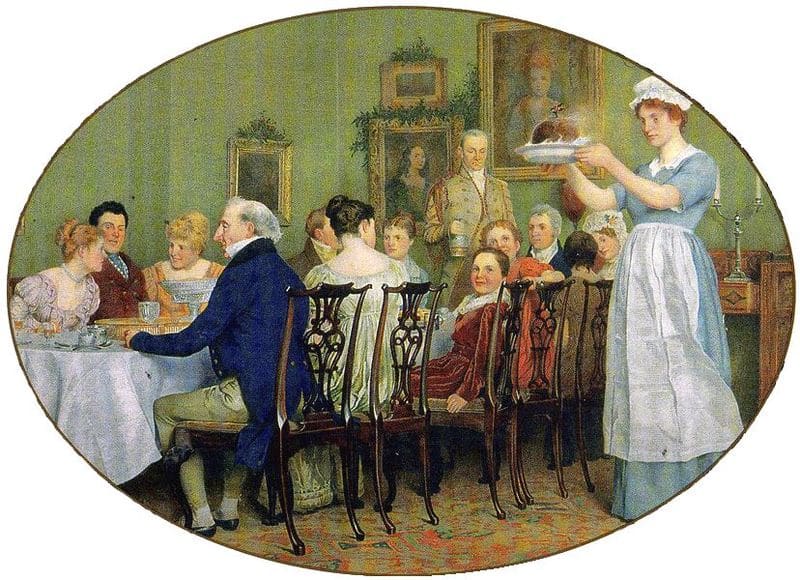It’s that time of year again—the season of being pummeled with advice on how to survive the holidays. All sorts of issues pop and bloom with the festivities: anxiety and stress, weight problems or financial worries. For me and my people, we have holiday hearing issues that exclude us from what’s going on.
This time of year is particularly tough for those of us who don’t hear very well and who may use hearing aids or cochlear implants. Almost every day, articles appear in our inbox from hearing professionals or other people who have it, telling us how to make the holidays more accessible and meaningful.
But really? All we want for Christmas is to understand what everyone else understands, and to be able to participate in real-time without having to ask for repeats every few seconds.
That’s not easy in a season of low ambient lighting, constant jingly-jangly music, and excited wine-fuelled people talking over each other around a long rectangular dinner table. We fall off the conversation boat and the people we love may not notice. That’s the most painful part of this season of togetherness—being left out.
Hearing Can be Difficult at Holiday Gatherings
The holiday-help articles offer valuable party tips: turn down the music and background noise, turn up the lights, make sure people face you when they talk and, most importantly, speak up for yourself when communication gets difficult. If you don’t let other people know what you need, when you need it, they may not realize you’re in trouble. (They’re supposed to know but they forget because we look as though we’re keeping up.)
But while these basic communication rules work well for a business meeting, they are tough nuts to crack at a holiday party.
What are you supposed to do? March over, turn down the sound system, crank up the lights, and announce:
“Listen up, everybody! I’ve got hearing loss and this party isn’t working for me. I have the right to enjoy myself as much as anyone else. Let’s gather quietly in a circle so that I can see everyone’s face, one person speaks at a time, and we limit alcohol intake so our voices don’t get shrill. OK! Who’s with me?”
After a few moments of stunned silence and a couple of mumbled ‘sorries’, people will go back to enjoying themselves, leaving you to slink off to a corner, or more likely out the front door.
Hearing Loss Holiday Tips
Consider these other creative, less over-the-top ideas for expressing your needs and staying connected during the holidays.
- Fake your faking. People with hearing loss often pretend they understand what’s going on. We copy other people’s facial expressions, or sit with a Mona Lisa-like smile, nodding our head in bluffed agreement. This doesn’t help anybody. Your family won’t notice or, even worse, they’ll ignore you. Ramp it up with some double-fake: smile like a hyena and nod like a bobble head. Your family will have to acknowledge your communication limbo, so that your guests don’t think you’ve gone off with the fairies.
- Get a saw. Pity the person with hearing loss at the typically chaotic and noisy holiday dinner. We can’t see all the lips, especially in rapid-fire conversation. What we get: …yo, pass the..no way!..oops, sorry…gad I hate peas..whoo-hoo, did she really..quit that, Billy! This year, get smart before the dinner: grab a saw and hack off those table corners to create a round table where you can see and talk with everyone. An alternative is to plunk a plywood circle on top of a square table and dress it up.
- Throw your own party. It’s your house—do what want. Light it up! Don’t play music! Invite only people with good voices and flexible lips! No utensils—people eat with their hands! What a party!
- Create original party favors. It doesn’t matter what they look like because the important stuff is inside: handwritten communication tips:
-
- Don’t talk with food in your mouth. Someone is trying to speech-read you!
- Don’t say anything that you’re not prepared to repeat.
- Watch the wine intake; slurred words are hard to understand. Also, stupid.
- Minimize the clattering of cutlery or Grandma’s hearing aid may explode.
- One person speaks at a time. Repeat offenders will get the smallest piece of pie or be the sole clean-up person. Punishment to be decided at the discretion of the resident person with hearing loss.
- Tattoos are this season’s must-have party wear. Try this temporary tattoo, perhaps on your forehead, in seasonal colors: I Read Lips. Move Yours Better.
Being included at this time of year is important to everyone. We need to remind our family that, because we love them, we want to understand them. But when sensible communication advice is not enough, do whatever it takes to hear and be heard. It’s the best gift we can give ourselves.
 Gael Hannan is a writer, speaker and advocate on hearing loss issues. In addition to her weekly blog The Better Hearing Consumer, which has an international following, Gael wrote the acclaimed book “The Way I Hear It: A Life with Hearing Loss“. She is regularly invited to present her uniquely humorous and insightful work to appreciative audiences around the world. Gael has received many awards for her work, which includes advocacy for a more inclusive society for people with hearing loss. She lives with her husband on Vancouver Island, British Columbia, Canada.
Gael Hannan is a writer, speaker and advocate on hearing loss issues. In addition to her weekly blog The Better Hearing Consumer, which has an international following, Gael wrote the acclaimed book “The Way I Hear It: A Life with Hearing Loss“. She is regularly invited to present her uniquely humorous and insightful work to appreciative audiences around the world. Gael has received many awards for her work, which includes advocacy for a more inclusive society for people with hearing loss. She lives with her husband on Vancouver Island, British Columbia, Canada.
**this piece has been updated for clarity. It originally published on December 8, 2015








“I Read Lips. Move Yours Better.” Oh, Gael. This is brilliant.
Lolololol… I’m getting that tatoo! Gael, you’re hilarious! Thanks for showing us the lighter side, the human side of living and loving with hearing loss!
I am not affected by holiday parties as don’t drink, weather isn’t hospitable to my health and manage better in most situations with Nucleus 6 speech processor. Also, I don’t tattoo as osteomyelitis and cochlear surgeries enough for me. Thank you!
If you put a mirror behind each member of the family sitting at the ROUND xmas table do you thing it would help with the conversation or do you have to say “WOULD YOU ALL SHUT UP, I CANT HEAR WHAT SHE’S SAYING” or would that be too offensive?
(sounds like my house; no offense intended)
I’m trying to figure out what the mirror behind the people you are talking to would help?
I just peed my pants.
Loved this post; it’s wonderful Gael!
“Don’t say anything you’re not prepared to repeat!” Stop those side conversations before they start. Reminds me of those embarrassing classroom episodes… you know the ones where you ask your seatmate what the teacher said only to be reprimanded for talking and not listening.
Gael, cute as ever!